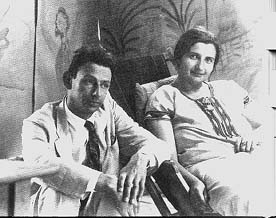Beyond learning from the way the German-speaking Jewish modernists related
to tradition, we can benefit from relating to them as a tradition in their
own right. Where the Germans turned to the Eastern European Jews in
search of a pre-modern authenticity, we can find in the German-speaking Jews an authentic tradition of Jewish modernity. Eisen himself is an excellent example of this recovery of the German modernist tradition. The last chapter of Rethinking Modern Judaism begins with (watch closely) Eisen telling the story of Gershom Scholem telling a Hasidic story about the value of telling stories. Eisen writes:
In this dizzyingly recursive passage, Eisen is retelling a story of the retelling
of a story of the retelling of a story. The layers of indirect discourse establish
both a distance between the narrator (Eisen) and the Torah of the Baal Shem Tov as
well as obscuring the distance between the reader and Scholem. Who is "we?"
There is among the German-speaking Jewish modernists a sincerity and an earnestness that I find refreshing, particularly in light of the my own rabbis' attempts to represent their traditions as "really" authentic. The modernists knew that we could never just click our heels three times like Dorothy and return to the innocence of pre-modern piety. Nor were they just making excuses for themselves, for their views did not in fact prevent them from practicing as much or as little Jewish ritual as they wanted. Thus while Scholem plumbed the depths of Jewish tradition without actually practicing any of it, Rosenzweig was increasingly rigorous in his observance. But what they all shared was a desire to find a non-blindered way to Judaism and to be enriched by the process. They were also confident that if we were willing to open our minds, exposure to Jewish traditions would affect us for the better. And they were willing to be destablized by their engagement with tradition; they knew that the search might alter the searcher. Thus Kafka gave the following instructions to an audience of German-speaking Jews before a Yiddish theater performance:
Gershom Scholem closed his landmark study of Jewish mysticism some fifty years ago with a story of the Baal Shem Tov…which Scholem saw as a parable for the current predicament of the Jews-indeed, for the contemporary religious situation more generally. The Baal Shem Tov, we are told, would go into the forest whenever faced with a difficult task. He would light a fire, say a prayer, "and what he had set out to perform was done." In the next generation, his disciple, the Maggid of Meseritz, could no longer light the fire, but he did know the place to go and the prayer to utter. The third generation could neither light the fire nor say the prayer, but it could still find the sacred place in the forest. All generations since cannot even do that. What then can they, can we, do? "We can tell the story of how it was done" and hope that, as the teller of this story (Scholem himself) assures us, our telling will have "the same effect as the actions of the other three."
 "We," of course, refers to us, to Eisen, to Scholem, and to the "generations since." Eisen is identifying here with Scholem to promote the German scholar's argument that it is acceptable to alter, reinvent, and renew tradition. Yet the two men are nonetheless telling two different stories and invoking two separate authorities. Scholem cites Eastern European tradition to make his point and validate his perspective; his story is about the "transformation of values" from one generation of Hasidim to the next. Eisen cites Scholem to endorse a particular way of being modern, to extend an air of authenticity to his own relationship with the Law.
"We," of course, refers to us, to Eisen, to Scholem, and to the "generations since." Eisen is identifying here with Scholem to promote the German scholar's argument that it is acceptable to alter, reinvent, and renew tradition. Yet the two men are nonetheless telling two different stories and invoking two separate authorities. Scholem cites Eastern European tradition to make his point and validate his perspective; his story is about the "transformation of values" from one generation of Hasidim to the next. Eisen cites Scholem to endorse a particular way of being modern, to extend an air of authenticity to his own relationship with the Law.
Stay still and suddenly you will find yourselves in the midst of Yiddish (Jargon). And as soon as the Yiddish has moved you-and Yiddish is everything, word, Hasidic melody, the very nature of these Eastern Jewish actors-then you will no longer be able to return to your earlier peace. Then you will feel the unity of Yiddish so strongly that you will no longer be afraid of Yiddish but of yourselves.




The Queer Guy at the Strip Club
Jay Michaelson
The Gifts of the German Jews: Toward a Postmodern Judaism
Michael Shurkin
My first shabbos
Jennifer Waters
Stones of Jerusalem
David Goldstein
Holocaust Video Testimonies: The Other Reality TV
Dan Friedman
Josh Tells a Bedtime Story
Josh Ring
Zeek in Print
Buy online here
Saddies
David Stromberg
About Zeek
The Zeek Archive
Links